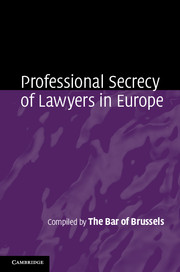Book contents
- Frontmatter
- Contents
- Contributors
- Preface
- 1 Professional secrecy in Europe
- 2 The CCBE rules on professional secrecy
- 3 Austria
- 4 Belgium
- 5 Bulgaria
- 6 Cyprus
- 7 Czech Republic
- 8 Denmark
- 9 Estonia
- 10 Finland
- 11 France
- 12 Germany
- 13 Greece
- 14 Hungary
- 15 Iceland
- 16 Ireland
- 17 Italy
- 18 Latvia
- 19 Liechtenstein
- 20 Lithuania
- 21 Luxembourg
- 22 Malta
- 23 The Netherlands
- 24 Norway
- 25 Poland
- 26 Portugal
- 27 Romania
- 28 Slovakia
- 29 Slovenia
- 30 Spain
- 31 Sweden
- 32 Switzerland
- 33 United Kingdom
- Index
- References
30 - Spain
Published online by Cambridge University Press: 05 June 2013
- Frontmatter
- Contents
- Contributors
- Preface
- 1 Professional secrecy in Europe
- 2 The CCBE rules on professional secrecy
- 3 Austria
- 4 Belgium
- 5 Bulgaria
- 6 Cyprus
- 7 Czech Republic
- 8 Denmark
- 9 Estonia
- 10 Finland
- 11 France
- 12 Germany
- 13 Greece
- 14 Hungary
- 15 Iceland
- 16 Ireland
- 17 Italy
- 18 Latvia
- 19 Liechtenstein
- 20 Lithuania
- 21 Luxembourg
- 22 Malta
- 23 The Netherlands
- 24 Norway
- 25 Poland
- 26 Portugal
- 27 Romania
- 28 Slovakia
- 29 Slovenia
- 30 Spain
- 31 Sweden
- 32 Switzerland
- 33 United Kingdom
- Index
- References
Summary
Preliminary note
In Spain, lawyers who are admitted to the Bar are subject to a duty of professional secrecy (which is not only attorney–client privilege). Only lawyers who are admitted to the Bar are entitled to appear in court defending their client (even though private individuals can also defend themselves and public institutions have their own legal representation that might not be incorporated in the Bar). Such lawyers are self-employed, although they can be partners or associates in a law firm. They must comply with the Bar's code of ethics. In Spain, there are eighty-three bar associations, one in each of fifty provinces and thirty-three with smaller jurisdiction. The size and number of affiliates of each bar varies greatly. Madrid has more than 30,000 members, whilst there are some bars with fewer than 100. The structure is, however, the same, one president (decano) and one board (junta de gobierno).
There is legally no distinction between lawyers who work for a company (in-house counsel) and other lawyers. Everyone has to be incorporated to the Bar and can use the title abogado. However, the legal representatives of state or public organisations (abogados del estado) do not need to be members of the Bar and usually are not. In recent years, in-house lawyers have begun to organise themselves in private consortiums.
- Type
- Chapter
- Information
- Professional Secrecy of Lawyers in Europe , pp. 524 - 544Publisher: Cambridge University PressPrint publication year: 2013

